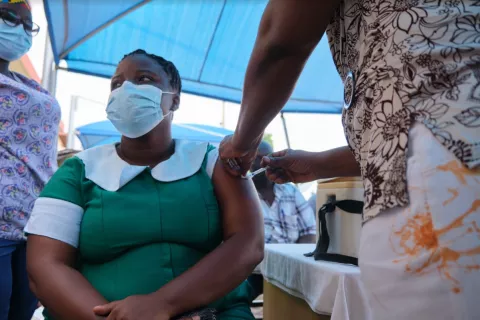Debunking COVID-19 myths with Ghana’s influencers
UNICEF, Ghana Health Service and GhanaFact address COVID-19 misinformation with influencers

With more than 15 million internet users in Ghana, social media platforms are buzzing with opinions, theories and lively debate. And in Ghana, the online rumour mill has played a powerful role in discouraging people in Ghana from take the COVID-19 vaccine.
As part of efforts to curtail these and to address the mis- and dis- information, the Government of Ghana’s Health Service, the Ministry of Information, FactSpace West Africa and UNICEF worked together to invite some of the country’s popular social media influencers to a sensitization workshop.
Well-known personalities attending this breakfast included blogger Ameyaw Debrah, TV presenter Natalie Fort, TikTok influencer Asantewaa, and Twitter influencers KalyJay and Da ‘Hammer.
The discussion in the workshop, held at UNICEF House, centered on building current and future partnerships in combating online misinformation on COVID-19 and the vaccinations, focusing on the positive impacts of vaccine administration throughout Ghana while encouraging people to receive their doses.
Representatives from Ghana Health Service and the Ministry of Information spoke about how far the nation had come since the beginning of the pandemic, citing the importance of distributing accurate information on vaccines and best safety practices. However the prevalence of misconceptions due to fake and inaccurate reports spread among the populace has impacted the progress.
“Recovering from initial misconceptions is very important” said the Manager of the Expanded Programme on Immunization, Dr Kwame Achiano.
Many influencers shared what they have seen first-hand on their platforms. A prevailing notion was that it was difficult to ascertain what was misinformation or not. TV News Anchor Natalie Fort noted there was a need to “constantly remind people [there] are the steps we have to take” to mitigate the spread of the virus.
GhanaFact highlighted the importance of “pausing before posting” to ensure the validity of information. Attendees whole-heartedly agreed with this sentiment, and even expressed the desire to utilize fact-checking tools such as social media bots.
As of 12 March 2022, more than 12.7 million COVID-19 doses have been administered in Ghana.
At the conclusion of the workshop, all influencers acknowledged the importance of continued collaboration between media and government sources. Edward Nana Poku Osei, known as Da’Hammer, a survivor of the virus - advised that showing the impact of COVID-19 is what can motivate people to action in obtaining the vaccine.
“It took 12 oxygen tanks before my saturation stabilized. I got the worst of COVID-19. It’s a beast of a disease. I documented what I went through because I thought I was going to die,” recalled Da ‘Hammer.
“In my opinion it would be more impactful if you see what you stand to get," Da 'Hammer continued. "I was lucky. I was basically lucky.”
Through the Social Behavioral Change and the Communication and Advocacy Units, UNICEF in Ghana will continue to engage social media influencers and other key stakeholders in seeking to address dis- and misinformation in respect of COVID-19, the vaccination and subsequently other priority areas.






